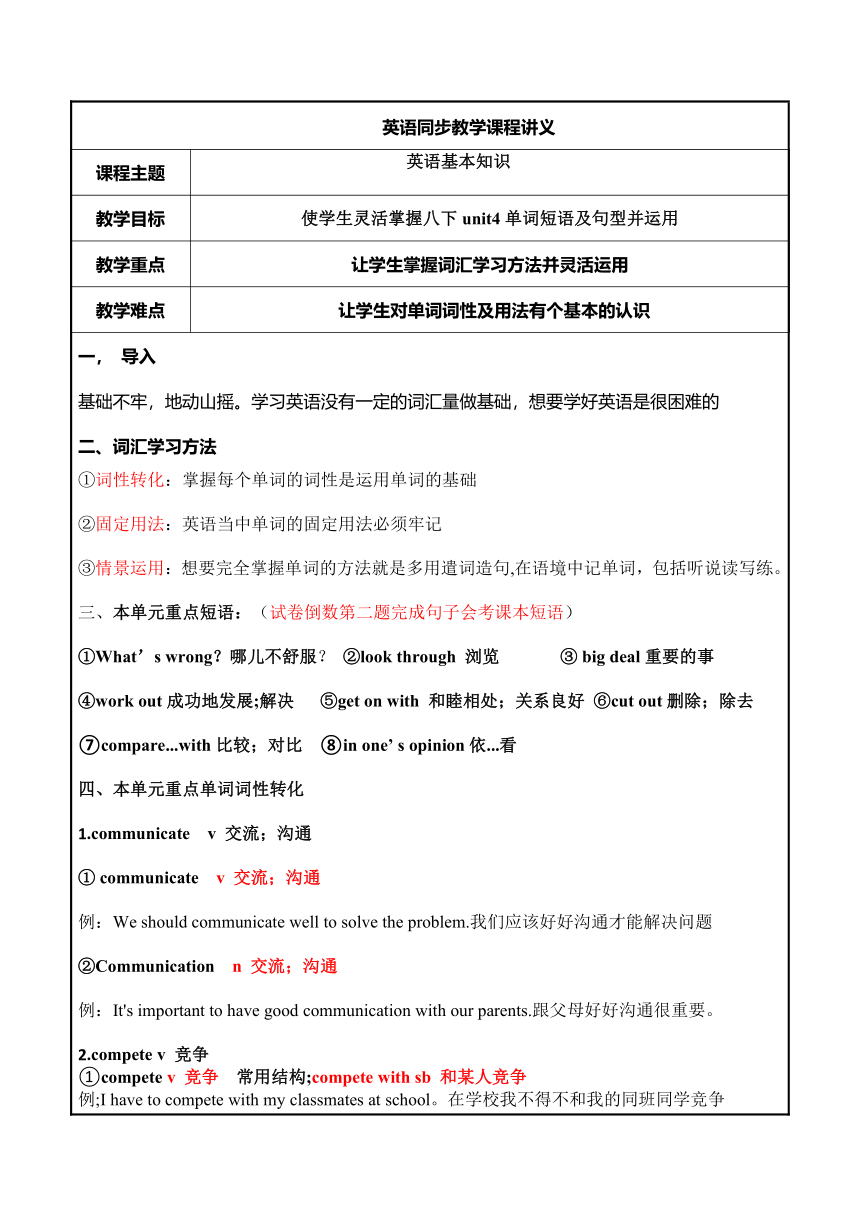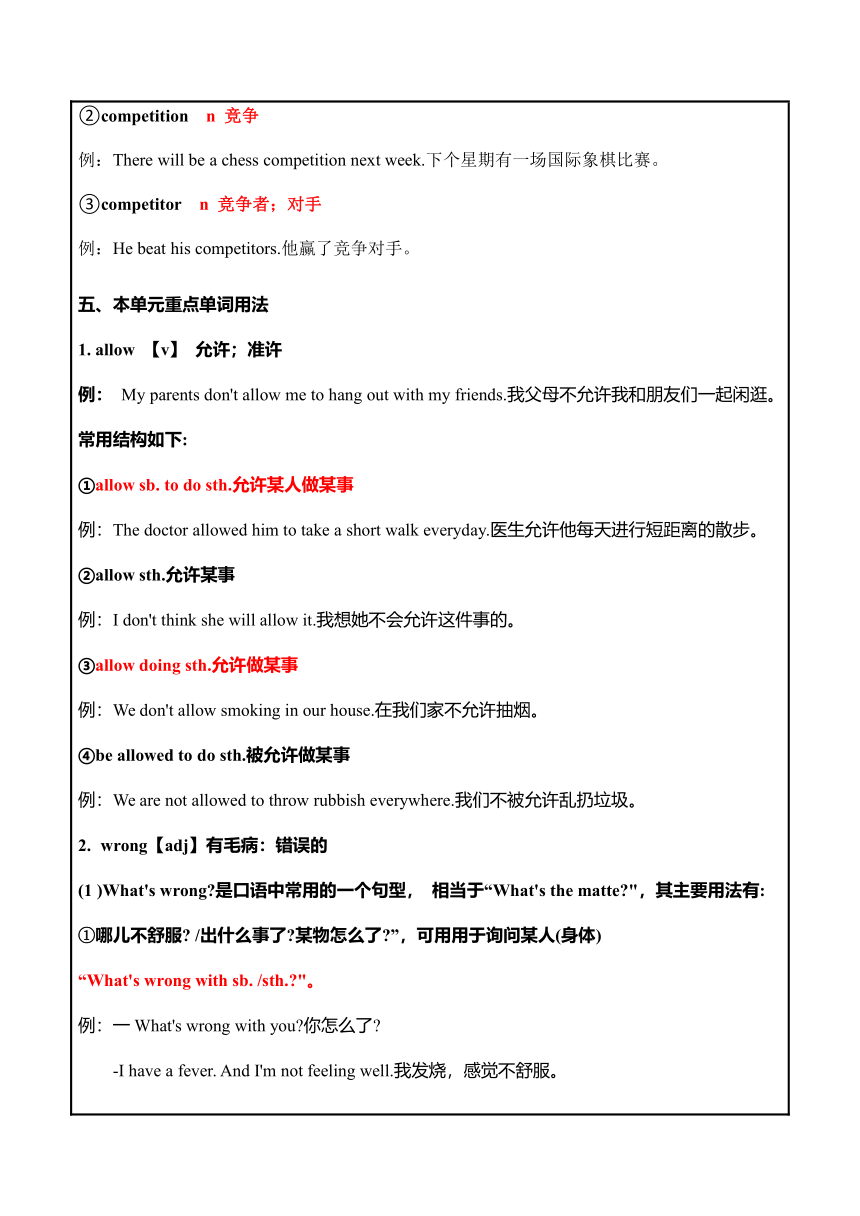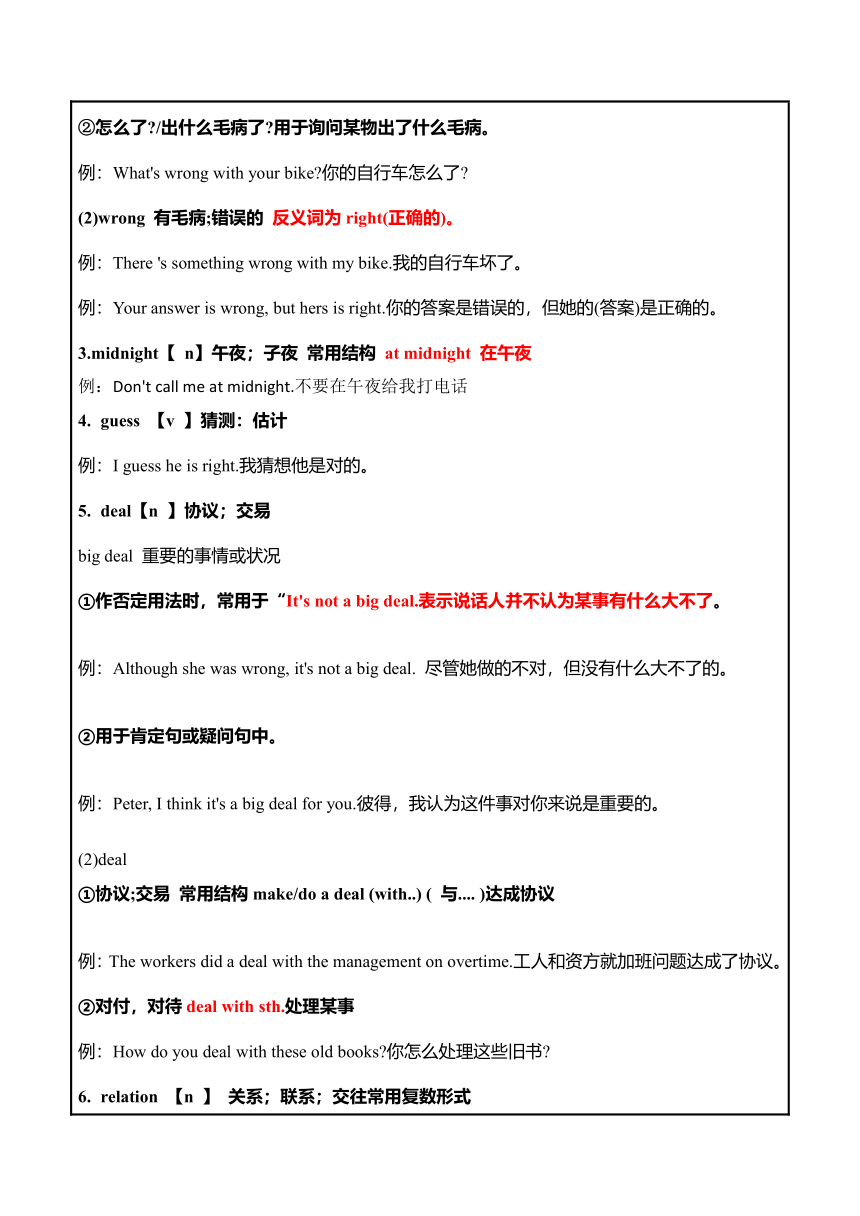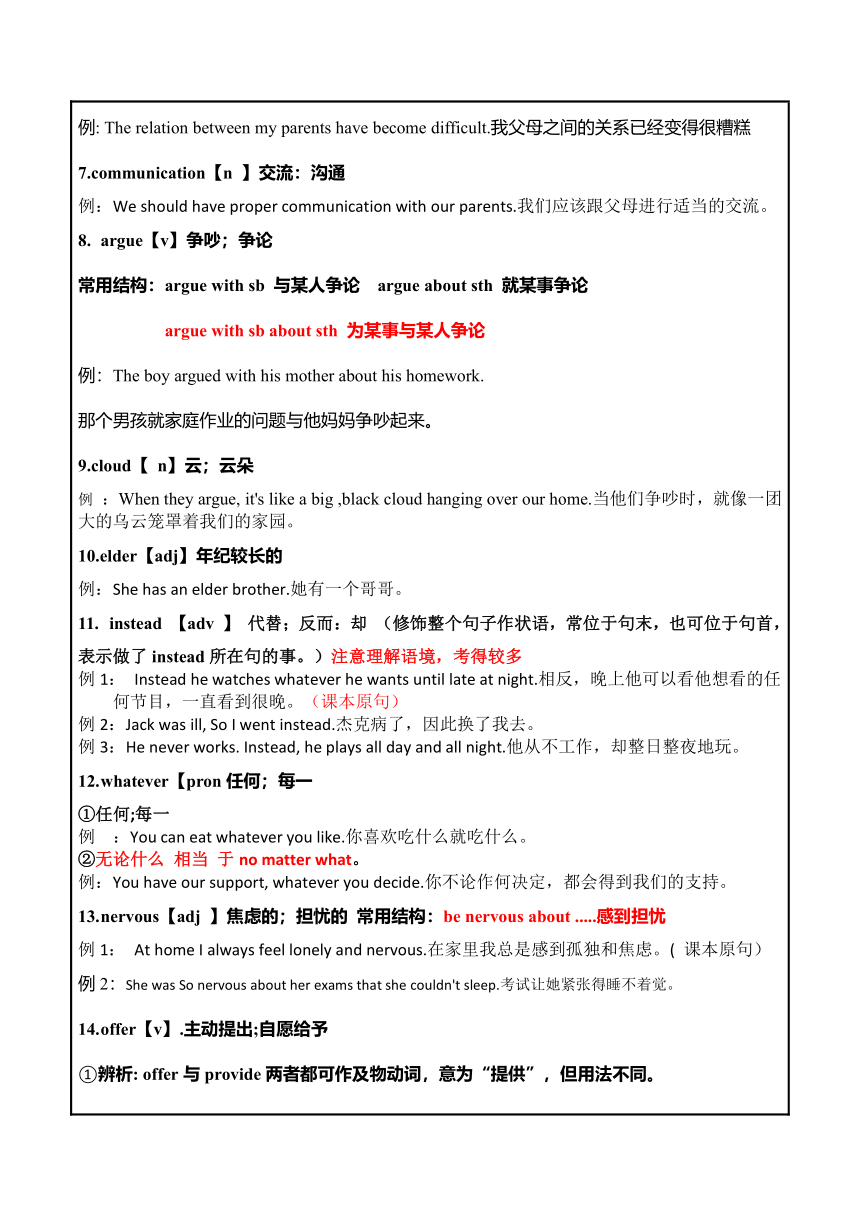人教版英语八年级下册Unit 4 Why don't you talk to your parents?单词词性及用法(表格式)
文档属性
| 名称 | 人教版英语八年级下册Unit 4 Why don't you talk to your parents?单词词性及用法(表格式) |  | |
| 格式 | doc | ||
| 文件大小 | 62.0KB | ||
| 资源类型 | 教案 | ||
| 版本资源 | 人教新目标(Go for it)版 | ||
| 科目 | 英语 | ||
| 更新时间 | 2022-03-16 14:13:35 | ||
图片预览




文档简介
英语同步教学课程讲义
课程主题 英语基本知识
教学目标 使学生灵活掌握八下unit4单词短语及句型并运用
教学重点 让学生掌握词汇学习方法并灵活运用
教学难点 让学生对单词词性及用法有个基本的认识
一, 导入
基础不牢,地动山摇。学习英语没有一定的词汇量做基础,想要学好英语是很困难的
二、词汇学习方法
①词性转化:掌握每个单词的词性是运用单词的基础
②固定用法:英语当中单词的固定用法必须牢记
③情景运用:想要完全掌握单词的方法就是多用遣词造句,在语境中记单词,包括听说读写练。
本单元重点短语:(试卷倒数第二题完成句子会考课本短语)
初中 英语 单项选择题答题技巧初中英语单项选择题的解题方法如何做好英语的单项选择题快速拿下英语单项选择题方法
①What’s wrong?哪儿不舒服? ②look through 浏览 ③ big deal重要的事
④work out成功地发展;解决 ⑤get on with 和睦相处;关系良好 ⑥cut out删除;除去
⑦compare...with比较;对比 ⑧in one’ s opinion依...看
本单元重点单词词性转化
1.communicate v 交流;沟通
初中 英语 单项选择题答题技巧初中英语单项选择题的解题方法如何做好英语的单项选择题快速拿下英语单项选择题方法
① communicate v 交流;沟通
例:We should communicate well to solve the problem.我们应该好好沟通才能解决问题
②Communication n 交流;沟通
例:It's important to have good communication with our parents.跟父母好好沟通很重要。
2.compete v 竞争
①compete v 竞争 常用结构;compete with sb 和某人竞争
例;I have to compete with my classmates at school。在学校我不得不和我的同班同学竞争
②competition n 竞争
例:There will be a chess competition next week.下个星期有一场国际象棋比赛。
③competitor n 竞争者;对手
例:He beat his competitors.他赢了竞争对手。
五、本单元重点单词用法
1. allow 【v】 允许;准许
例: My parents don't allow me to hang out with my friends.我父母不允许我和朋友们一起闲逛。
常用结构如下:
①allow sb. to do sth.允许某人做某事
例:The doctor allowed him to take a short walk everyday.医生允许他每天进行短距离的散步。
②allow sth.允许某事
例:I don't think she will allow it.我想她不会允许这件事的。
③allow doing sth.允许做某事
例:We don't allow smoking in our house.在我们家不允许抽烟。
④be allowed to do sth.被允许做某事
例:We are not allowed to throw rubbish everywhere.我们不被允许乱扔垃圾。
wrong【adj】有毛病:错误的
(1 )What's wrong 是口语中常用的一个句型, 相当于“What's the matte ",其主要用法有:
①哪儿不舒服 /出什么事了 某物怎么了 ”,可用用于询问某人(身体)
“What's wrong with sb. /sth. "。
例:一What's wrong with you 你怎么了
-I have a fever. And I'm not feeling well.我发烧,感觉不舒服。
②怎么了 /出什么毛病了 用于询问某物出了什么毛病。
例:What's wrong with your bike 你的自行车怎么了
(2)wrong 有毛病;错误的 反义词为right(正确的)。
例:There 's something wrong with my bike.我的自行车坏了。
例:Your answer is wrong, but hers is right.你的答案是错误的,但她的(答案)是正确的。
3.midnight【 n】午夜;子夜 常用结构 at midnight 在午夜
例:Don't call me at midnight.不要在午夜给我打电话
guess 【v 】猜测:估计
例:I guess he is right.我猜想他是对的。
deal【n 】协议;交易
big deal 重要的事情或状况
①作否定用法时,常用于“It's not a big deal.表示说话人并不认为某事有什么大不了。
例:Although she was wrong, it's not a big deal. 尽管她做的不对,但没有什么大不了的。
②用于肯定句或疑问句中。
例:Peter, I think it's a big deal for you.彼得,我认为这件事对你来说是重要的。
(2)deal
①协议;交易 常用结构make/do a deal (with..) ( 与.... )达成协议
例:The workers did a deal with the management on overtime.工人和资方就加班问题达成了协议。
②对付,对待deal with sth.处理某事
例:How do you deal with these old books 你怎么处理这些旧书
relation 【n 】 关系;联系;交往常用复数形式
例: The relation between my parents have become difficult.我父母之间的关系已经变得很糟糕
7.communication【n 】交流:沟通
例:We should have proper communication with our parents.我们应该跟父母进行适当的交流。
argue【v】争吵;争论
常用结构:argue with sb 与某人争论 argue about sth 就某事争论
argue with sb about sth 为某事与某人争论
例:The boy argued with his mother about his homework.
那个男孩就家庭作业的问题与他妈妈争吵起来。
9.cloud【 n】云;云朵
例 :When they argue, it's like a big ,black cloud hanging over our home.当他们争吵时,就像一团大的乌云笼罩着我们的家园。
10.elder【adj】年纪较长的
例:She has an elder brother.她有一个哥哥。
instead 【adv 】 代替;反而:却 (修饰整个句子作状语,常位于句末,也可位于句首,表示做了instead所在句的事。)注意理解语境,考得较多
例1: Instead he watches whatever he wants until late at night.相反,晚上他可以看他想看的任何节目,一直看到很晚。(课本原句)
例2:Jack was ill, So I went instead.杰克病了,因此换了我去。
例3:He never works. Instead, he plays all day and all night.他从不工作,却整日整夜地玩。
whatever【pron任何;每一
①任何;每一
例 :You can eat whatever you like.你喜欢吃什么就吃什么。
②无论什么 相当 于no matter what。
例:You have our support, whatever you decide.你不论作何决定,都会得到我们的支持。
nervous【adj 】焦虑的;担忧的 常用结构:be nervous about .....感到担忧
例1: At home I always feel lonely and nervous.在家里我总是感到孤独和焦虑。( 课本原句)
例2:She was So nervous about her exams that she couldn't sleep.考试让她紧张得睡不着觉。
offer【v】.主动提出;自愿给予
①辨析: offer与provide两者都可作及物动词,意为“提供”,但用法不同。
※ offer sb. sth. =offer sth. to sb,
例1:She offered me a job. = She offered a job to me.她提供给我一份工作。
例2:The school provided food for the students.
=The school provided the students with food.学校为学生们提供伙食。
②offer to do sth.意为“主动做某事”
例:If your parents are having problems, you should offer to help.如果你的父母遇到问题,你应该主动提供帮助。( 课本原句)
15.proper 【adj】正确的:怡当的
例:We should wear proper clothes as middle school students.我们应该穿合适的衣服作为中学生
16.secondly 【adv】第二;其次
例:Firstly we should obey the school rules, secondly we should study hard.首先我们应该遵守校规,第二我们应该努力学习。
municate 【v】交流;沟通 常用结构 communicate with ab 和某人交流
例:I often communicate with her on the phone.我经常和她在电话中交流
18.explain 【v】解释:说明 后接名词或从句 常用结构:explain sth to sb 向某人解释某事
例:Can you explain the meaning of this word.你能解释一下这个单词的意思吗?
19. clear 【adj】清楚易懂的;晴朗的
①清楚易懂的
例:The question is very clear.这个问题很清楚。
②晴朗的(指天气)
例:It was a sunny day yesterday.昨天是晴朗的一天。
20. copy v【v】抄袭:模仿;复制;复印 :
例:Don't copy other 's homework. 不要抄袭别人的作业。
21return 【v】归还:回来;返回
①归还 及物动词 常用结构return sth. to sb.把某物还给某人 相当于give..back。
例1:You must return the keys next Monday.下周一你必须归还图书。
例2;Don't forget to return my books to me.别忘了把钥匙还给我。
②回来;返回 return to+地点名词 回到某地 相当于come back。
例:He returned to school by bike yesterday.昨天他骑自行车返回学校。
22.anymore 【adv】.(常用于否定句和疑问句末)再也(不);(不)再 常用于否定句和疑问句句
not...anymore 相当于 no more 不再 通常用于实前be后
例1:Your best friend does not trust you anymore.你最好的朋友不再信任你。
例2:I won't copy his homework anymore.
=I will no more copy his homework.我不会再抄他的家庭作业了。
member n【n】成员:分子
例:We are all members of the class.我们都是班级的一员。
23.pressure 【n】压力
例:Too much pressure is bad for health.太多的压力对健康有害。
pete 【v】竞争;对抗 常用结构 compete with sb 与某人竞争
例句:I have to compete with my classmates at school.在学校我不得不和我的同班同学竞争。
opinion 【n】意见;想法;看法 常用结构:in one's opinion 在某人看来
例:In my opinion, we should read more books.在我看来,我们应该多读点书
skill【n】技艺:技巧
例:We should learn some exam skills.我们应该学习一些考试 技巧。
typical 【adj】典型的
例:The Taylors are a typical American family.泰勒一家是一个典型的美国家庭
football 【n】(美式)橄榄球;足球
例;I'm good at playing football.我擅长踢足球。
quick 【adj】.快的;迅速的:时间短暂的
例;They had a quick breakfast and went to work.他们匆匆吃过早饭然后去上班。
continue 【v】 .持续;继续存在
例;Competition stats at a young age and continues until the kids get older.在孩子很小的时候竞争就开始了,并且持续到孩子长大
compare【v】比较
例:Don't compare yourself with others.不要与其他人比较。
crazy 【adj】不理智的;疯狂的 常用结构 be crazy about ..对...痴迷
例1:It's crazy to stay up late.熬夜不睡觉是不理智的.
例2:Many people are crazy about computer games.有很多人对电脑游戏很痴迷
push【v】.鞭策;督促;推动
例:People shouldn't push their kids so hard.人们不该把自己的孩子逼得太紧。
development【n】发展;发育;成长
例:Doctors say too much stress is bad for children's development.医生说太多的压力不利于孩子的发展
cause 【v】造成;引起
例:Too much homework may cause a lot of pressure on children.太多的作业可能会对孩子们造成太大的压力
usual 【adj】通常的:寻常的 副词 usually
例:Parents usually put too much pressure on their children.父母通常给了孩子太多的压力。
perhaps 【adv】可能;大概:也许 常用于句首,相当于maybe
例:Perhaps/ Maybe Tom will try out for the basketball team.或许Tom 将会参加篮球队的选拔。
六、经典例题
单项选择
( )1. The parents never allow their daughter out alone at night.
A. go B. goes C. to go D. going
( )2. --- I don't know how to play this game.
--- Don't worry. Let me the roles of it to you first.
A. explain B. suggest C. predict D. talk
( )3. Try to . Do not depend on your dictionary all the time.
A. know B. achieve C. help D. guess
( )4. Tom is about football and he watches football matches on TV every day.
A. worried B. happy C. crazy D. surprise
( ) 5. They had a rest and then working on their problems.
A. continued B. minded C. needed D. went
( ) 6. I the newspaper and didn't find anything interesting.
A. looked after B. looked up
C. looked through D. looked out
( ) 7. We also learn how to well with others at school.
A. get to B. get on C. get down D. get up
( ) 8. Tom was kind. He his seat to the old man on the bus.
A. passed B. lifted C. threw D. offered
( ) 9. There is no need to argue her these problems.
A. about; with B. with; about C. to; for D. with; for
( )10. --- I can't stand my parents. They always ask me to learn this and practice that.
--- Why don't you sit down and them
A. compete with B. instead of
C. get on with D. communicate with
( )11. His parents won't allow him .
A. come B. coming C. to come D. came
( )12. He offered me to the station.
A. drive B. drives C. driving D. to drive
( )13. Sometimes my parents don’t understand me. Talk with them more often and you’ll _______them.
A.fall in love with B. get on well with C. agree with D. compare with
( )14. ----Excuse me, how long can I keep the book
----You can _________ by the end of this month.
A .give it away B. come up with it C. give it back D. lend it again
( )15. Why did you give up smoking , Mr. Green .
----Because it may ______cancer(癌症) if I smoke all the time.
A. hurt B. hit C. play D. cause
参考答案
1-5 CADCA
6-10CBDBD
11-15CDBCD
课程主题 英语基本知识
教学目标 使学生灵活掌握八下unit4单词短语及句型并运用
教学重点 让学生掌握词汇学习方法并灵活运用
教学难点 让学生对单词词性及用法有个基本的认识
一, 导入
基础不牢,地动山摇。学习英语没有一定的词汇量做基础,想要学好英语是很困难的
二、词汇学习方法
①词性转化:掌握每个单词的词性是运用单词的基础
②固定用法:英语当中单词的固定用法必须牢记
③情景运用:想要完全掌握单词的方法就是多用遣词造句,在语境中记单词,包括听说读写练。
本单元重点短语:(试卷倒数第二题完成句子会考课本短语)
初中 英语 单项选择题答题技巧初中英语单项选择题的解题方法如何做好英语的单项选择题快速拿下英语单项选择题方法
①What’s wrong?哪儿不舒服? ②look through 浏览 ③ big deal重要的事
④work out成功地发展;解决 ⑤get on with 和睦相处;关系良好 ⑥cut out删除;除去
⑦compare...with比较;对比 ⑧in one’ s opinion依...看
本单元重点单词词性转化
1.communicate v 交流;沟通
初中 英语 单项选择题答题技巧初中英语单项选择题的解题方法如何做好英语的单项选择题快速拿下英语单项选择题方法
① communicate v 交流;沟通
例:We should communicate well to solve the problem.我们应该好好沟通才能解决问题
②Communication n 交流;沟通
例:It's important to have good communication with our parents.跟父母好好沟通很重要。
2.compete v 竞争
①compete v 竞争 常用结构;compete with sb 和某人竞争
例;I have to compete with my classmates at school。在学校我不得不和我的同班同学竞争
②competition n 竞争
例:There will be a chess competition next week.下个星期有一场国际象棋比赛。
③competitor n 竞争者;对手
例:He beat his competitors.他赢了竞争对手。
五、本单元重点单词用法
1. allow 【v】 允许;准许
例: My parents don't allow me to hang out with my friends.我父母不允许我和朋友们一起闲逛。
常用结构如下:
①allow sb. to do sth.允许某人做某事
例:The doctor allowed him to take a short walk everyday.医生允许他每天进行短距离的散步。
②allow sth.允许某事
例:I don't think she will allow it.我想她不会允许这件事的。
③allow doing sth.允许做某事
例:We don't allow smoking in our house.在我们家不允许抽烟。
④be allowed to do sth.被允许做某事
例:We are not allowed to throw rubbish everywhere.我们不被允许乱扔垃圾。
wrong【adj】有毛病:错误的
(1 )What's wrong 是口语中常用的一个句型, 相当于“What's the matte ",其主要用法有:
①哪儿不舒服 /出什么事了 某物怎么了 ”,可用用于询问某人(身体)
“What's wrong with sb. /sth. "。
例:一What's wrong with you 你怎么了
-I have a fever. And I'm not feeling well.我发烧,感觉不舒服。
②怎么了 /出什么毛病了 用于询问某物出了什么毛病。
例:What's wrong with your bike 你的自行车怎么了
(2)wrong 有毛病;错误的 反义词为right(正确的)。
例:There 's something wrong with my bike.我的自行车坏了。
例:Your answer is wrong, but hers is right.你的答案是错误的,但她的(答案)是正确的。
3.midnight【 n】午夜;子夜 常用结构 at midnight 在午夜
例:Don't call me at midnight.不要在午夜给我打电话
guess 【v 】猜测:估计
例:I guess he is right.我猜想他是对的。
deal【n 】协议;交易
big deal 重要的事情或状况
①作否定用法时,常用于“It's not a big deal.表示说话人并不认为某事有什么大不了。
例:Although she was wrong, it's not a big deal. 尽管她做的不对,但没有什么大不了的。
②用于肯定句或疑问句中。
例:Peter, I think it's a big deal for you.彼得,我认为这件事对你来说是重要的。
(2)deal
①协议;交易 常用结构make/do a deal (with..) ( 与.... )达成协议
例:The workers did a deal with the management on overtime.工人和资方就加班问题达成了协议。
②对付,对待deal with sth.处理某事
例:How do you deal with these old books 你怎么处理这些旧书
relation 【n 】 关系;联系;交往常用复数形式
例: The relation between my parents have become difficult.我父母之间的关系已经变得很糟糕
7.communication【n 】交流:沟通
例:We should have proper communication with our parents.我们应该跟父母进行适当的交流。
argue【v】争吵;争论
常用结构:argue with sb 与某人争论 argue about sth 就某事争论
argue with sb about sth 为某事与某人争论
例:The boy argued with his mother about his homework.
那个男孩就家庭作业的问题与他妈妈争吵起来。
9.cloud【 n】云;云朵
例 :When they argue, it's like a big ,black cloud hanging over our home.当他们争吵时,就像一团大的乌云笼罩着我们的家园。
10.elder【adj】年纪较长的
例:She has an elder brother.她有一个哥哥。
instead 【adv 】 代替;反而:却 (修饰整个句子作状语,常位于句末,也可位于句首,表示做了instead所在句的事。)注意理解语境,考得较多
例1: Instead he watches whatever he wants until late at night.相反,晚上他可以看他想看的任何节目,一直看到很晚。(课本原句)
例2:Jack was ill, So I went instead.杰克病了,因此换了我去。
例3:He never works. Instead, he plays all day and all night.他从不工作,却整日整夜地玩。
whatever【pron任何;每一
①任何;每一
例 :You can eat whatever you like.你喜欢吃什么就吃什么。
②无论什么 相当 于no matter what。
例:You have our support, whatever you decide.你不论作何决定,都会得到我们的支持。
nervous【adj 】焦虑的;担忧的 常用结构:be nervous about .....感到担忧
例1: At home I always feel lonely and nervous.在家里我总是感到孤独和焦虑。( 课本原句)
例2:She was So nervous about her exams that she couldn't sleep.考试让她紧张得睡不着觉。
offer【v】.主动提出;自愿给予
①辨析: offer与provide两者都可作及物动词,意为“提供”,但用法不同。
※ offer sb. sth. =offer sth. to sb,
例1:She offered me a job. = She offered a job to me.她提供给我一份工作。
例2:The school provided food for the students.
=The school provided the students with food.学校为学生们提供伙食。
②offer to do sth.意为“主动做某事”
例:If your parents are having problems, you should offer to help.如果你的父母遇到问题,你应该主动提供帮助。( 课本原句)
15.proper 【adj】正确的:怡当的
例:We should wear proper clothes as middle school students.我们应该穿合适的衣服作为中学生
16.secondly 【adv】第二;其次
例:Firstly we should obey the school rules, secondly we should study hard.首先我们应该遵守校规,第二我们应该努力学习。
municate 【v】交流;沟通 常用结构 communicate with ab 和某人交流
例:I often communicate with her on the phone.我经常和她在电话中交流
18.explain 【v】解释:说明 后接名词或从句 常用结构:explain sth to sb 向某人解释某事
例:Can you explain the meaning of this word.你能解释一下这个单词的意思吗?
19. clear 【adj】清楚易懂的;晴朗的
①清楚易懂的
例:The question is very clear.这个问题很清楚。
②晴朗的(指天气)
例:It was a sunny day yesterday.昨天是晴朗的一天。
20. copy v【v】抄袭:模仿;复制;复印 :
例:Don't copy other 's homework. 不要抄袭别人的作业。
21return 【v】归还:回来;返回
①归还 及物动词 常用结构return sth. to sb.把某物还给某人 相当于give..back。
例1:You must return the keys next Monday.下周一你必须归还图书。
例2;Don't forget to return my books to me.别忘了把钥匙还给我。
②回来;返回 return to+地点名词 回到某地 相当于come back。
例:He returned to school by bike yesterday.昨天他骑自行车返回学校。
22.anymore 【adv】.(常用于否定句和疑问句末)再也(不);(不)再 常用于否定句和疑问句句
not...anymore 相当于 no more 不再 通常用于实前be后
例1:Your best friend does not trust you anymore.你最好的朋友不再信任你。
例2:I won't copy his homework anymore.
=I will no more copy his homework.我不会再抄他的家庭作业了。
member n【n】成员:分子
例:We are all members of the class.我们都是班级的一员。
23.pressure 【n】压力
例:Too much pressure is bad for health.太多的压力对健康有害。
pete 【v】竞争;对抗 常用结构 compete with sb 与某人竞争
例句:I have to compete with my classmates at school.在学校我不得不和我的同班同学竞争。
opinion 【n】意见;想法;看法 常用结构:in one's opinion 在某人看来
例:In my opinion, we should read more books.在我看来,我们应该多读点书
skill【n】技艺:技巧
例:We should learn some exam skills.我们应该学习一些考试 技巧。
typical 【adj】典型的
例:The Taylors are a typical American family.泰勒一家是一个典型的美国家庭
football 【n】(美式)橄榄球;足球
例;I'm good at playing football.我擅长踢足球。
quick 【adj】.快的;迅速的:时间短暂的
例;They had a quick breakfast and went to work.他们匆匆吃过早饭然后去上班。
continue 【v】 .持续;继续存在
例;Competition stats at a young age and continues until the kids get older.在孩子很小的时候竞争就开始了,并且持续到孩子长大
compare【v】比较
例:Don't compare yourself with others.不要与其他人比较。
crazy 【adj】不理智的;疯狂的 常用结构 be crazy about ..对...痴迷
例1:It's crazy to stay up late.熬夜不睡觉是不理智的.
例2:Many people are crazy about computer games.有很多人对电脑游戏很痴迷
push【v】.鞭策;督促;推动
例:People shouldn't push their kids so hard.人们不该把自己的孩子逼得太紧。
development【n】发展;发育;成长
例:Doctors say too much stress is bad for children's development.医生说太多的压力不利于孩子的发展
cause 【v】造成;引起
例:Too much homework may cause a lot of pressure on children.太多的作业可能会对孩子们造成太大的压力
usual 【adj】通常的:寻常的 副词 usually
例:Parents usually put too much pressure on their children.父母通常给了孩子太多的压力。
perhaps 【adv】可能;大概:也许 常用于句首,相当于maybe
例:Perhaps/ Maybe Tom will try out for the basketball team.或许Tom 将会参加篮球队的选拔。
六、经典例题
单项选择
( )1. The parents never allow their daughter out alone at night.
A. go B. goes C. to go D. going
( )2. --- I don't know how to play this game.
--- Don't worry. Let me the roles of it to you first.
A. explain B. suggest C. predict D. talk
( )3. Try to . Do not depend on your dictionary all the time.
A. know B. achieve C. help D. guess
( )4. Tom is about football and he watches football matches on TV every day.
A. worried B. happy C. crazy D. surprise
( ) 5. They had a rest and then working on their problems.
A. continued B. minded C. needed D. went
( ) 6. I the newspaper and didn't find anything interesting.
A. looked after B. looked up
C. looked through D. looked out
( ) 7. We also learn how to well with others at school.
A. get to B. get on C. get down D. get up
( ) 8. Tom was kind. He his seat to the old man on the bus.
A. passed B. lifted C. threw D. offered
( ) 9. There is no need to argue her these problems.
A. about; with B. with; about C. to; for D. with; for
( )10. --- I can't stand my parents. They always ask me to learn this and practice that.
--- Why don't you sit down and them
A. compete with B. instead of
C. get on with D. communicate with
( )11. His parents won't allow him .
A. come B. coming C. to come D. came
( )12. He offered me to the station.
A. drive B. drives C. driving D. to drive
( )13. Sometimes my parents don’t understand me. Talk with them more often and you’ll _______them.
A.fall in love with B. get on well with C. agree with D. compare with
( )14. ----Excuse me, how long can I keep the book
----You can _________ by the end of this month.
A .give it away B. come up with it C. give it back D. lend it again
( )15. Why did you give up smoking , Mr. Green .
----Because it may ______cancer(癌症) if I smoke all the time.
A. hurt B. hit C. play D. cause
参考答案
1-5 CADCA
6-10CBDBD
11-15CDBCD
同课章节目录
- Unit 1 What's the matter?
- Section A
- Section B
- Unit 2 I'll help to clean up the city parks.
- Section A
- Section B
- Unit 3 Could you please clean your room?
- Section A
- Section B
- Unit 4 Why don't you talk to your parents?
- Section A
- Section B
- Unit 5 What were you doing when the rainstorm came
- Section A
- Section B
- Review of Units 1-5
- Unit 6 An old man tried to move the mountains.
- Section A
- Section B
- Unit 7 What's the highest mountain in the world?
- Section A
- Section B
- Unit 8 Have you read Treasure Island yet?
- Section A
- Section B
- Unit 9 Have you ever been to a museum?
- Section A
- Section B
- Unit 10 I've had this bike for three years.
- Section A
- Section B
